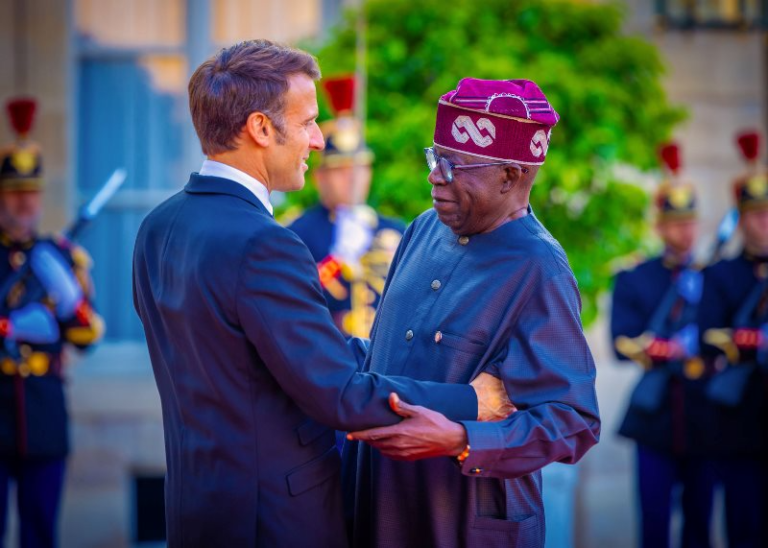By Sola Ojewusi
In recent weeks, President Bola Ahmed Tinubu’s state visit to France has garnered mixed reactions. While critics have raised concerns, calling it a diplomatic faux pas, a closer analysis reveals the trip as a calculated move aimed at strengthening Nigeria’s position on the global stage, fostering bilateral ties, and reinforcing its leadership role in Africa. The visit, far from being a misstep, underscores Nigeria’s strategic priorities in economic revitalization, regional stability, and global influence.
Economic Gains and Bilateral Agreements
France, as one of Europe’s major economic powers, has long been a key partner for African nations. Nigeria, Africa’s largest economy, stands to benefit immensely from enhanced relations with France. During the visit, President Tinubu engaged with French President Emmanuel Macron and key French business leaders to secure vital economic partnerships. The agreements reached span critical sectors, including energy, infrastructure, and agriculture.
1. Energy Collaboration: Nigeria, an energy powerhouse, is seeking to diversify its energy sector. French energy firms such as TotalEnergies already have significant stakes in Nigeria’s oil and gas sectors. President Tinubu’s visit fostered discussions to expand investments in renewable energy and gas projects, aligning with Nigeria’s energy transition goals.
2. Infrastructure Development: France’s expertise in infrastructure offers an opportunity for Nigeria to fast-track its transportation and urban development projects. French firms committed to supporting the Lagos Blue Line and other metro systems, which could ease urban congestion and boost economic productivity.
3. Agricultural Support: A partnership with French agricultural organizations promises to enhance Nigeria’s food security through the transfer of technology and improved supply chain systems.
Diplomatic and Regional Significance
President Tinubu’s visit to France also signals Nigeria’s intent to assert itself as a diplomatic heavyweight in Africa. By engaging with France, a key player in Africa’s francophone regions, Nigeria is working to bridge the divide between Anglophone and Francophone African countries.
1. Strengthening ECOWAS: Tinubu’s leadership in the Economic Community of West African States (ECOWAS) has already been on display in tackling regional challenges like the Niger coup crisis. A closer partnership with France enhances Nigeria’s ability to mediate and lead in West African affairs, given France’s historical ties with the region.
2. Countering Insecurity: Discussions also included strategies to address the growing threat of terrorism in the Sahel. Nigeria and France agreed to collaborate on intelligence sharing and capacity building to strengthen regional security.
3. Cementing Leadership: Nigeria’s interaction with France showcases its readiness to collaborate with global powers while advocating for African interests. This leadership is crucial for tackling global challenges such as climate change, debt restructuring, and economic inequality.
Nigeria-France Relations in a Global Context
Beyond regional benefits, the visit is a statement of Nigeria’s global ambitions. France, a permanent member of the United Nations Security Council, is a valuable ally in promoting Nigeria’s aspirations for greater global representation, including its push for a permanent seat on the Security Council.
Additionally, Nigeria’s participation in France’s Africa-focused initiatives, such as the Paris Summit for a New Global Financial Pact, underscores its role in shaping global policy frameworks that address Africa’s challenges.
Public Diplomacy and Cultural Exchange
President Tinubu’s visit included engagements that highlighted Nigeria’s cultural richness. These efforts help to project Nigeria positively on the global stage, attracting tourism and fostering goodwill. The Nigerian government also used the visit to encourage the diaspora community in France to contribute to national development.
Conclusion: A Pragmatic Approach to Diplomacy
Critics of President Tinubu’s visit to France may view it through a narrow lens, but its strategic benefits are clear. The trip not only reinforced Nigeria’s economic and diplomatic priorities but also strengthened its leadership position in Africa and beyond.
Nigeria’s partnership with France offers a roadmap for addressing pressing challenges while opening doors to new opportunities. Far from being a diplomatic faux pas, the visit underscores Nigeria’s readiness to lead on the African continent and engage with global powers as an equal partner.

